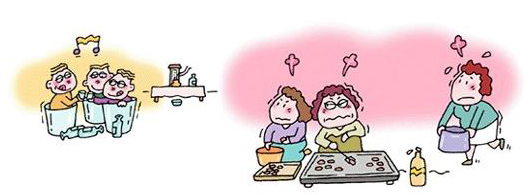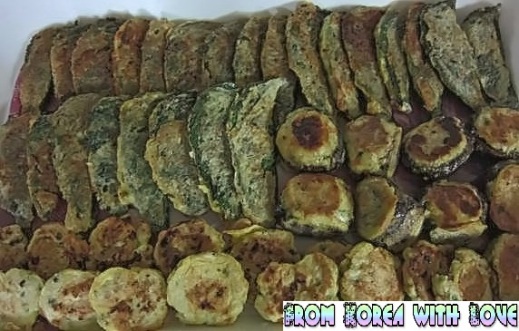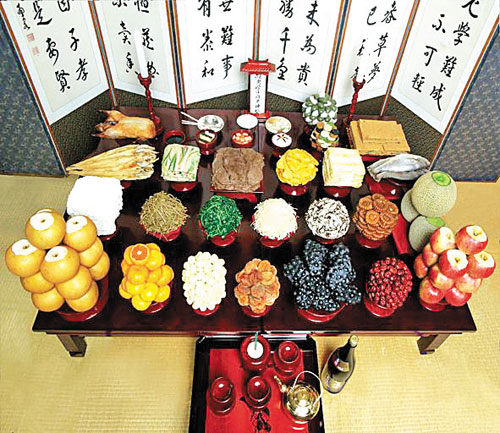Last night, I was reading an article about fake casts for daughters-in-law in Korea who want to avoid Chuseok chores. According to the article, the fake casts sold like hotcakes. Women wear them on Chuseok and pretend that they are injured, so they won’t have to help around the kitchen. One may ask, “Why do these women resort to deception just to shun house work?’ I may not have the gall to wear a fake cast and lie to my parents-in-law like these women, but I am one of the many myeonuris who dread having to do chores on Chuseok.
Chuseok (추석: Thanksgiving Day) is one of the biggest and most important holidays in Korea when families visit their ancestral homes and gather to share ceremonial feasts, but for a myeonuri (며느리: daughter-in-law) like me, Chuseok is more of donkey work than a celebration of gratitude for a bountiful harvest. I don’t mean to sound so negative aboutChuseok, but when this holiday comes, it’s impossible to enjoy my days off because of all the chores that I have to do.
Chuseok holiday period lasts for three days, but this year, it is from September 6 to 10. Imagine five days of agony! It’s not that myeonuris work continuously all those days, but we just can’t get over the so-called “daughter-in-law holiday syndrome” until Chuseok is officially over.
Lucky for me, I am NOT in Korea, so this year, I was able to evade all the chores and the stress that come with Chuseok. All I had to do was to call my parents-in-law in Korea and greet them.
Because Chuseok is a big celebration, there is a lot of food that needs to be prepared. My husband comes from a traditional clan, so the women in the family are the ones obliged to do all the work in the kitchen, while the men play Go-stop, watch TV or enjoy their chitchat. As much as I loathe the chores, I hate the fact that women do all the tedious work while men have all the fun.

The unfairness of Chuseok preparation as illustrated here (SOURCE: The Korea Blog)
Our Chuseok chores begin the day before the actual celebration. We wake up early and go to the eldest uncle’s house to prepare the food for the next day. Most mothers-in-law and daughters-in-law work together, but my Omonim (mother-in-law) is always busy with her business, so she never comes to help. My husband has many uncles, so their wives, the oldermyeonuris, do most of the cooking, while my sisters-in-law and I, the younger myeonuris, help with the preparation and do the cleaning. I always volunteer to cook jeon, because it seems to be the easiest thing to do… and I like arranging them nicely on a tray once they are cooked. Mind you, I’m not talking about frying four or five kinds of jeon for a small family. It’s for the whole clan! It takes me the entire morning to finish the task. After tidying up the kitchen or washing the dishes, I’m free to go… but NOT really free, because there’s work that needs to be done in the house, too.

Jeon, also known as Korean pancake, is served as an important food for jesasang (제사상) or ceremonial table setting for ancestral rites.
As Christians, we don’t perform ancestral rites on Chuseok called charye (차례), so we don’t have to prepare an elaborate ceremonial feast. In the morning, one of my husband’s uncles, who is a pastor, leads worship. After that, the women will be busy in the kitchen. The men are served breakfast. Abonim (father-in-law) and the uncles get to eat first, and they always have the best seats in the house. Omonim and the aunties rarely eat together with their husbands. I’ve noticed that the older women are more concerned with refilling their husbands’ bowls than minding their own food. This isn’t the case with me and my sisters-in-law. We eat at the same table with our husbands. (Sometimes it’s our husbands who serve us. ^^)
Maybe because we are much younger, we have learned to do things differently. We cater to our husbands, but at the same time, we take care of our needs. Servin
g the elders, however, is A MUST.
Myeonuris are expected to stay in the eldest uncle’s house for the whole day. We take our lunch and dinner there, but most of the time, we cook, serve and clean. In the afternoon, the men go to their ancestors’ graves to pay respects, while the women chat a little or take a rest.

Ceremonial table setting for charye with various kinds of traditional food (SOURCE: The Chosun Ilbo)
My first Chuseok wasn't so bad. I was interested in learning how to cook traditional Korean food, so I didn't mind working in the kitchen... but when I was left to wash tons of dishes by myself, I felt like crying. My husband must have known how upset I was, so he came to help me. The aunties teased him, because he was the only man in the kitchen. That is probably why he stayed away from the kitchen from then on.
Last year, my in-laws decided to have our own Chuseok gathering in the house besides the one annually hosted by the eldest uncle's family. I didn't fancy the idea, because it meant more house work having two gatherings in one day, but what can a myeonuri do? I have two sisters-in-law who also help with the chores, but their responsibilities begin with setting the table and end with putting away the dishes. They never stay too long in the house, I guess because they know what awaits them when the party's over. It's usually the eldest son's wife, the older myeonuri, who has to do most of the work, but in my husband's family, it's the other way around. My husband is the youngest son, which makes me the youngest myeonuri, but we live with the in-laws, so most of the older myeonuri duties are given to me.
Last year, my in-laws decided to have our own Chuseok gathering in the house besides the one annually hosted by the eldest uncle's family. I didn't fancy the idea, because it meant more house work having two gatherings in one day, but what can a myeonuri do? I have two sisters-in-law who also help with the chores, but their responsibilities begin with setting the table and end with putting away the dishes. They never stay too long in the house, I guess because they know what awaits them when the party's over. It's usually the eldest son's wife, the older myeonuri, who has to do most of the work, but in my husband's family, it's the other way around. My husband is the youngest son, which makes me the youngest myeonuri, but we live with the in-laws, so most of the older myeonuri duties are given to me.
Last year, my in-laws decided to have our own Chuseok gathering in the house besides the one annually hosted by the eldest uncle's family. I didn't fancy the idea, because it meant more house work having two gatherings in one day, but what can a myeonuri do? I have two sisters-in-law who also help with the chores, but their responsibilities begin with setting the table and end with putting away the dishes. They never stay too long in the house, I guess because they know what awaits them when the party's over. It's usually the eldest son's wife, the older myeonuri, who has to do most of the work, but in my husband's family, it's the other way around. My husband is the youngest son, which makes me the youngest myeonuri, but we live with the in-laws, so most of the older myeonuri duties are given to me.
Last year, my in-laws decided to have our own Chuseok gathering in the house besides the one annually hosted by the eldest uncle's family. I didn't fancy the idea, because it meant more house work having two gatherings in one day, but what can a myeonuri do? I have two sisters-in-law who also help with the chores, but their responsibilities begin with setting the table and end with putting away the dishes. They never stay too long in the house, I guess because they know what awaits them when the party's over. It's usually the eldest son's wife, the older myeonuri, who has to do most of the work, but in my husband's family, it's the other way around. My husband is the youngest son, which makes me the youngest myeonuri, but we live with the in-laws, so most of the older myeonuri duties are given to me.
Last year, my in-laws decided to have our own Chuseok gathering in the house besides the one annually hosted by the eldest uncle's family. I didn't fancy the idea, because it meant more house work having two gatherings in one day, but what can a myeonuri do? I have two sisters-in-law who also help with the chores, but their responsibilities begin with setting the table and end with putting away the dishes. They never stay too long in the house, I guess because they know what awaits them when the party's over. It's usually the eldest son's wife, the older myeonuri, who has to do most of the work, but in my husband's family, it's the other way around. My husband is the youngest son, which makes me the youngest myeonuri, but we live with the in-laws, so most of the older myeonuri duties are given to me.
Last year, my in-laws decided to have our own Chuseok gathering in the house besides the one annually hosted by the eldest uncle's family. I didn't fancy the idea, because it meant more house work having two gatherings in one day, but what can a myeonuri do? I have two sisters-in-law who also help with the chores, but their responsibilities begin with setting the table and end with putting away the dishes. They never stay too long in the house, I guess because they know what awaits them when the party's over. It's usually the eldest son's wife, the older myeonuri, who has to do most of the work, but in my husband's family, it's the other way around. My husband is the youngest son, which makes me the youngest myeonuri, but we live with the in-laws, so most of the older myeonuri duties are given to me.
Last year, my in-laws decided to have our own Chuseok gathering in the house besides the one annually hosted by the eldest uncle's family. I didn't fancy the idea, because it meant more house work having two gatherings in one day, but what can a myeonuri do? I have two sisters-in-law who also help with the chores, but their responsibilities begin with setting the table and end with putting away the dishes. They never stay too long in the house, I guess because they know what awaits them when the party's over. It's usually the eldest son's wife, the older myeonuri, who has to do most of the work, but in my husband's family, it's the other way around. My husband is the youngest son, which makes me the youngest myeonuri, but we live with the in-laws, so most of the older myeonuri duties are given to me.
Last year, my in-laws decided to have our own Chuseok gathering in the house besides the one annually hosted by the eldest uncle's family. I didn't fancy the idea, because it meant more house work having two gatherings in one day, but what can a myeonuri do? I have two sisters-in-law who also help with the chores, but their responsibilities begin with setting the table and end with putting away the dishes. They never stay too long in the house, I guess because they know what awaits them when the party's over. It's usually the eldest son's wife, the older myeonuri, who has to do most of the work, but in my husband's family, it's the other way around. My husband is the youngest son, which makes me the youngest myeonuri, but we live with the in-laws, so most of the older myeonuri duties are given to me.
The truth is, my Chuseok chores are nothing compared to those of other myeonuries. Some myeonuris I know spend days making Chuseok preparations, while mean mothers-in-law constantly hound them. I am grateful for my Omonim, because she doesn't pressure me. My husband's relatives are kind, too... at least this is a consolation.
Some myeonuris have to endure hours of travel time to get to their in-laws' home provinces only to work like slaves in the kitchen. My husband's paternal relatives live nearby, so we don't have to travel far. What irks me are the work load and not being able to spend the holiday as I please.
Before marriage, I was told that foreign wives are usually given less work, since Chuseok is something new to them, but I never believed that. I have always known that being a foreigner does not give any daughter-in-law in Korea an excuse for failing to fulfill her duties as a myeonuri, especially on important family gatherings when all eyes are on us. Foreigner or not, married women in Korea are bound by the traditional role of an obedient and diligent daughter-in-law.
Now that Chuseok is finally over, let me congratulate my fellow myeonuris for making it through another year of "forced labor". I know that most of us rarely get thanks or thumbs up, but everyone knows that Chuseok won't be possible without our hard work.






Recent comments